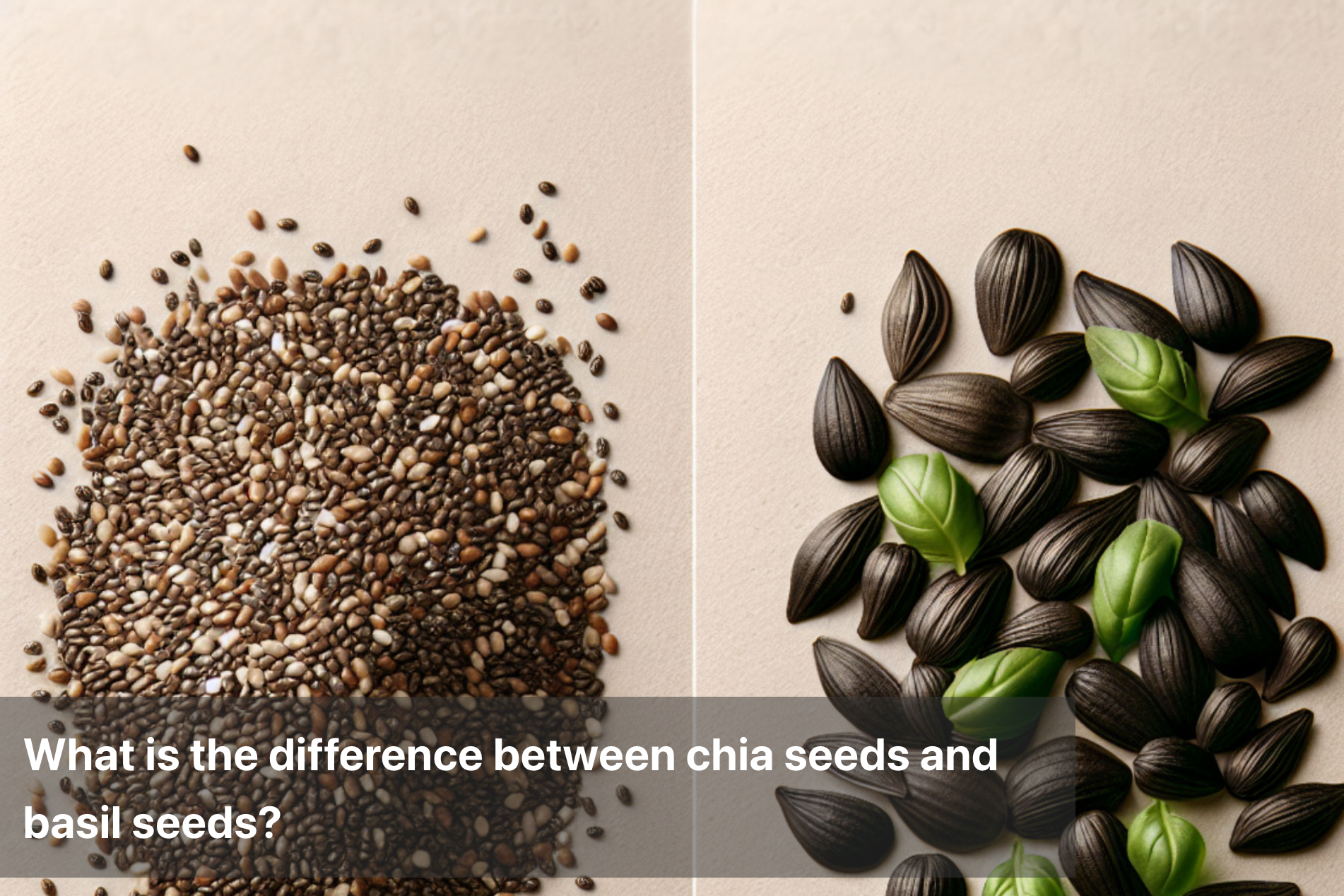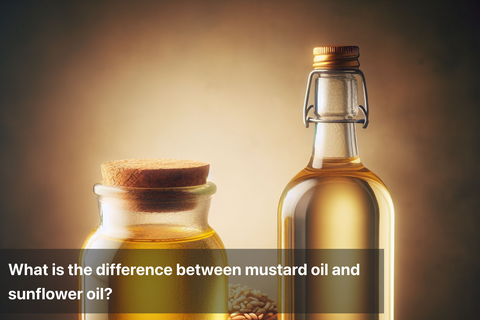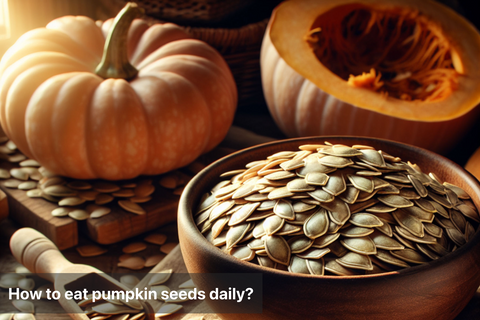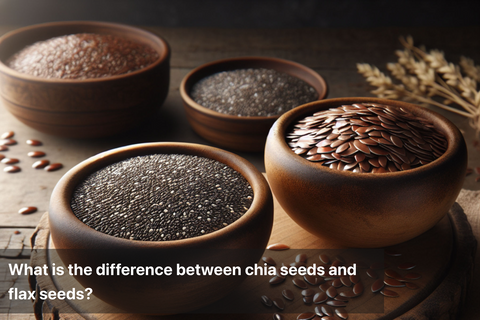
What is the difference between chia seeds and basil seeds?
Chia seeds and basil seeds have gain tremendous attention in the health food community in recent years. Originating from different plants, chia seeds come from the Salvia hispanica plant native to Central and South America, while basil seeds are harvested from the sweet basil plant, primarily found in Asia. Both seeds have a rich history of use, but they cater to different culinary practices and health benefits.
Chia seeds gained popularity thanks to their high nutrient density, including omega-3 fatty acids, fiber, and protein. On the other hand, basil seeds are often recognized for their cooling properties and potential digestive benefits, making them a staple in traditional Asian diets.
When comparing chia seeds vs basil seeds, numerous health enthusiasts are curious about their unique offerings. For instance, chia seeds absorb water and expand in size, creating a gel-like texture, which makes them versatile in smoothies, puddings, and baked goods. Contrastingly, basil seeds swell differently but are often used in beverages and desserts, providing a crunchy texture.
With the growing focus on healthy eating, understanding the difference between chia seeds and basil seeds can help individuals choose the right addition to their diets based on their nutritional needs and culinary preferences.

Nutritional Comparison
Nutrition Table for Chia Seeds (per 28 grams or about 2 tablespoons)
Nutrient |
Amount |
|---|---|
Calories |
137 kcal |
Protein |
4.7 g |
Fat |
8.6 g |
Omega-3 (Alpha-Linolenic Acid) |
5.1 g |
Carbohydrates |
12 g |
Vitamin C |
0 mg |
Vitamin B1 (Thiamine) |
0.17 mg |
Nutrition Table for Basil Seeds (per 28 grams or about 2 tablespoons)
Nutrient |
Amount |
|---|---|
Calories |
120 kcal |
Protein |
4 g |
Fat |
6 g |
Carbohydrates |
28 g |
Fiber |
14 g |
Sugars |
0 g |
Vitamin C |
0 mg |
Vitamin A |
0 IU |
Culinary Uses: How to Incorporate Chia Seeds and Basil Seeds
Chia Seeds:
Chia Pudding: Combine chia seeds with milk (dairy or plant-based) and a sweetener like honey or maple syrup. Let it sit overnight in the fridge to form a thick, pudding-like texture.
Baked Goods: Incorporate chia seeds into muffins, cookies, bread, and other baked goods. They can be mixed into the batter or used as an egg substitute when soaked in water.
Sprinkle on Foods: Add chia seeds to salads, oatmeal, yogurt, and cereals for extra crunch and nutritional benefits.
Chia Drinks: Mix chia seeds into water or coconut water for a refreshing drink, allowing them to soak and expand for added texture.
Basil Seeds:
Hydrating Drinks: Soak basil seeds in water, coconut water, or fruit juices, allowing them to expand and create a gel-like texture. This drink is refreshing and hydrating, perfect for hot weather.
Desserts: Use basil seeds in puddings, jellies, or other Asian-inspired desserts, combining them with coconut milk or fruit juices for a unique twist.
In Salads and Soups: Add soaked basil seeds to salads or soups as a crunchy topping for an extra boost of fiber and nutrients.
In Water for Cooling Effect: Basil seeds are often consumed in water for their cooling properties, which can help regulate body temperature during hot weather.
Key Differences in Culinary Uses:
Chia Seeds are versatile in both wet and dry applications. They are great in baked goods, puddings, and smoothies.
Basil Seeds are primarily used after soaking and are ideal for hydration, cooling drinks, and refreshing desserts.
Health Benefits of Chia Seeds vs Basil Seeds
Chia Seeds:
Rich in Omega-3 Fatty Acids: Chia seeds are an excellent source of ALA (alpha-linolenic acid), a type of omega-3 fatty acid that supports heart health and reduces inflammation.
High in Fiber: With their impressive fiber content, chia seeds aid digestion, promote regular bowel movements, and help in weight management by providing a sense of fullness.
Blood Sugar Regulation: Chia seeds help stabilize blood sugar levels by slowing down the absorption of carbohydrates, making them a great option for diabetes management.
Supports Heart Health: The combination of fiber, omega-3s, and antioxidants in chia seeds helps reduce cholesterol levels and support overall cardiovascular health.
Basil Seeds:
Aids Digestion: Basil seeds are known to promote healthy digestion by improving gut health, easing constipation, and reducing bloating.
Blood Sugar Control: Basil seeds have been shown to help lower blood sugar levels by improving insulin sensitivity, making them beneficial for people with diabetes.
Hydration and Cooling Effect: When soaked in water, basil seeds swell and provide hydration. They are often used for their cooling effects, especially in hot climates, which help balance body temperature.
Rich in Calcium and Iron: Basil seeds are a good source of calcium and iron, which contribute to bone strength and better oxygen circulation in the blood.

Choosing Between Chia and Basil Seeds
When considering whether to choose chia seeds or basil seeds, it helps to understand their key differences and similarities. Both seeds are packed with nutrients, but they offer slightly different benefits. Chia seeds are renowned for their high omega-3 fatty acid content, fiber, and protein, making them a great choice for anyone looking to boost their heart health and support weight management.
On the other hand, basil seeds, often found in Asian cuisines, provide a unique texture and are beneficial for digestive health due to their high fiber content. They also have properties that may help reduce inflammation and promote hydration.
Incorporating either seed into your diet can be beneficial, depending on your specific needs and preferences. If you’re looking for a versatile ingredient to add to smoothies or baked goods, chia seeds may be the better option. Conversely, if you enjoy experimenting with culinary traditions or need something refreshing in drinks, basil seeds might be your preferred choice.
Ultimately, the decision boils down to personal dietary goals. Understanding the difference between chia seeds and basil seeds can guide you in making an informed choice that aligns with your health objectives.
This Blog post is an initiative by Lo! Foods, to provide accurate and Nutritionist / Doctor approved information related to Health. Lo! Foods is India's leading brand for Everyday Functional Foods. Foods designed for specific Health conditions or Needs. Lo! Foods also runs India's largest range of Low Carb Healthy Cloud Kitchens, under the brand names of Lo!, ProteinChef, ATH (All Things Healthy) and DiabeSmart.













Leave a comment
Your email address will not be published.